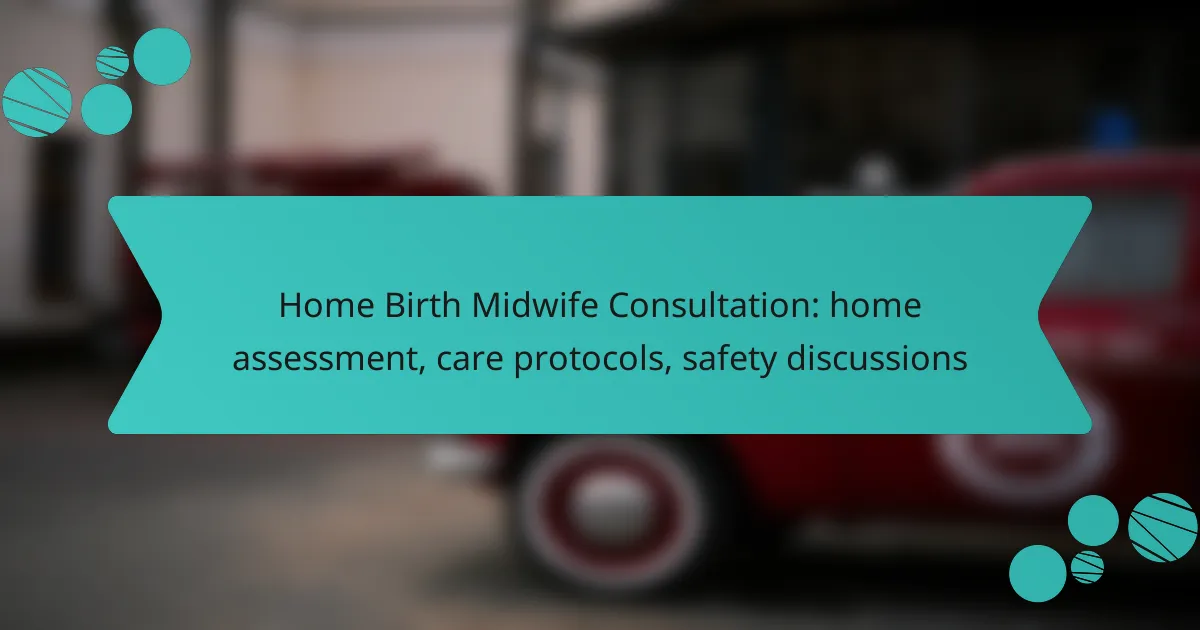A home birth midwife consultation is an essential meeting designed to prepare families for a safe and supportive home birth experience. During this session, a midwife will assess the home environment, discuss care protocols, and address any safety concerns, ensuring that expectant parents feel informed and confident in their birthing plan.
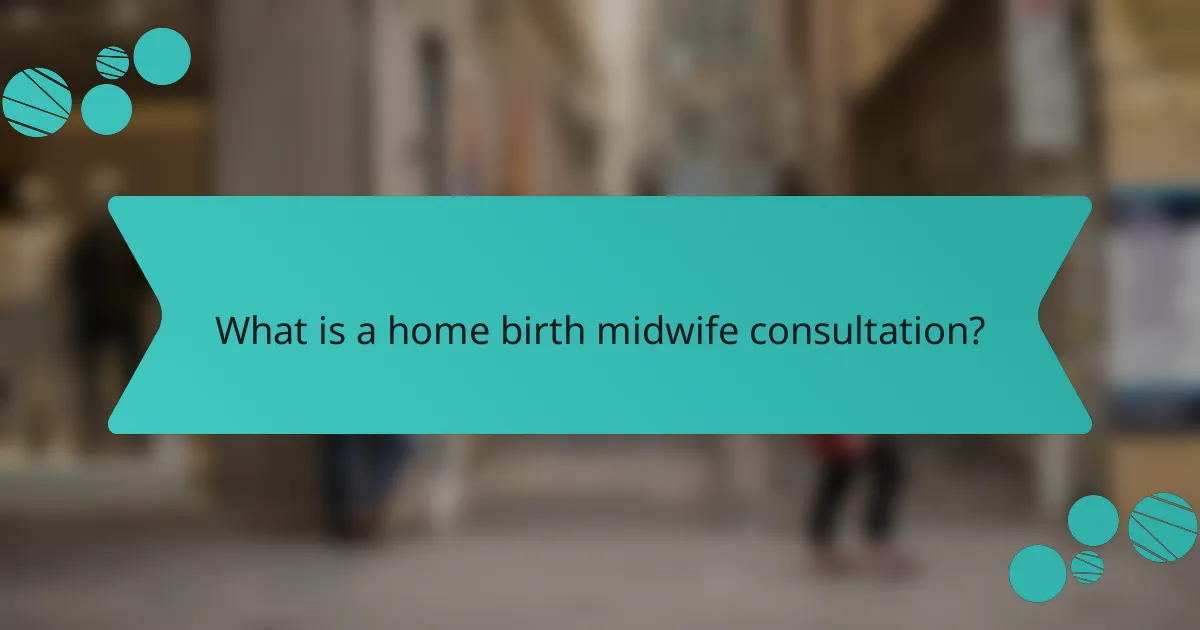
What is a home birth midwife consultation?
A home birth midwife consultation is a meeting between a midwife and a family planning a home birth. This session typically involves assessing the home environment, discussing care protocols, and addressing safety concerns to ensure a safe birthing experience.
Definition of home birth midwife consultation
A home birth midwife consultation is an initial evaluation where a midwife visits the family’s home to discuss the logistics of a home birth. During this consultation, the midwife assesses the suitability of the home environment, reviews the family’s medical history, and outlines the care plan for labor and delivery.
This meeting is crucial for establishing a trusting relationship between the midwife and the family, as well as ensuring that all parties are aligned on expectations and protocols. It typically lasts one to two hours, allowing ample time for questions and discussions.
Role of midwives in home birth
Midwives play a vital role in home births by providing personalized care and support throughout the pregnancy, labor, and postpartum period. They are trained to monitor the mother and baby’s health, manage labor, and assist with delivery in a home setting.
In addition to clinical care, midwives also educate families about the birthing process, offer emotional support, and help create a comfortable environment for the birth. They are responsible for ensuring that safety protocols are followed and are equipped to handle emergencies should they arise.

What are the benefits of a home birth midwife consultation?
A home birth midwife consultation offers personalized support and guidance tailored to your specific needs, ensuring a safe and comfortable birthing experience. This consultation helps expectant parents understand the protocols, safety measures, and care options available for home births.
Personalized care plans
During a home birth midwife consultation, the midwife will assess your health history and preferences to create a personalized care plan. This plan typically includes details about prenatal visits, labor support, and postpartum care, ensuring that every aspect of your experience is tailored to your needs.
Expectant parents can discuss their birth preferences, including pain management options and emergency protocols. This collaborative approach fosters trust and clarity, allowing parents to feel more prepared and empowered as they approach their birthing experience.
Comfort of home environment
One of the significant advantages of a home birth midwife consultation is the emphasis on the comfort of your home environment. Being in a familiar space can reduce anxiety and promote relaxation during labor, which can positively impact the birthing process.
The midwife will evaluate your home setup to ensure it meets safety standards for a home birth. This includes assessing space for labor, delivery, and immediate postpartum care, as well as discussing any necessary equipment or supplies to have on hand, such as birthing pools or emergency kits.
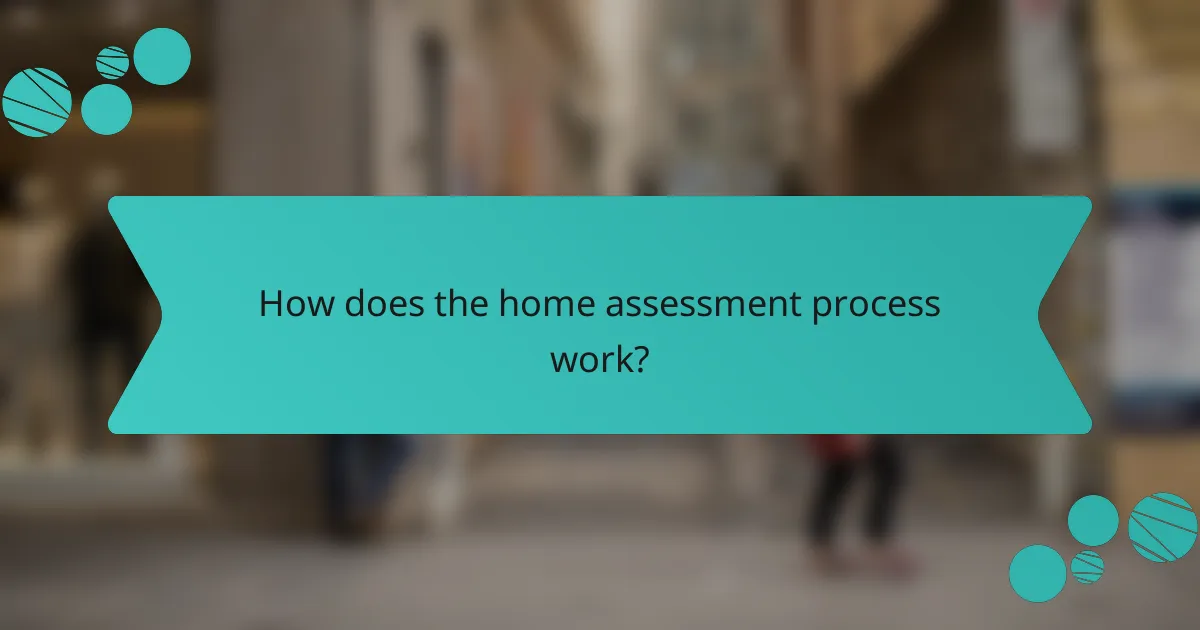
How does the home assessment process work?
The home assessment process involves a midwife visiting your residence to evaluate its suitability for a home birth. This assessment focuses on safety, comfort, and necessary resources to support a successful delivery.
Initial home visit details
The initial home visit typically lasts between one to two hours. During this time, the midwife will discuss your birth plan, review your medical history, and assess your home environment. It’s advisable to have any relevant medical records and a list of questions ready for this meeting.
Scheduling the visit early in your pregnancy allows ample time for any adjustments or preparations needed before the birth. Make sure to choose a time when you can focus and engage fully with the midwife.
Key factors assessed during consultation
Several key factors are evaluated during the consultation, including the layout of your home, access to emergency services, and the availability of necessary supplies. The midwife will check for adequate space for birthing equipment and comfort for both you and your support team.
Safety is paramount; the midwife will assess potential hazards and ensure that your home meets local health regulations. Discussing your preferences and any concerns openly can help tailor the assessment to your specific needs.
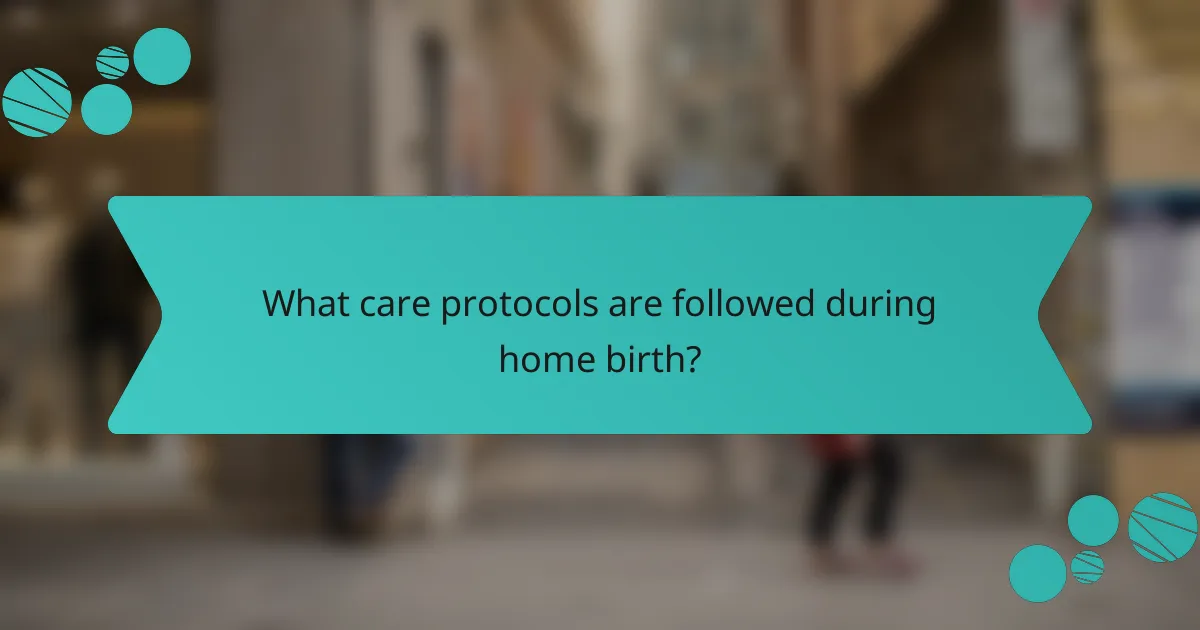
What care protocols are followed during home birth?
During home birth, care protocols focus on ensuring the safety and well-being of both the mother and the baby. These protocols typically include thorough assessments, continuous monitoring, and established guidelines for various stages of labor and delivery.
Standard care protocols
Standard care protocols for home birth involve a comprehensive assessment of the mother’s health and the home environment prior to delivery. Midwives conduct evaluations to ensure that the home is suitable for birth, including access to necessary supplies and a clean, safe area for delivery.
Throughout labor, midwives monitor vital signs, contractions, and fetal heart rate to ensure both mother and baby are stable. They also provide emotional support and guidance, helping the mother to manage pain and make informed decisions during the birthing process.
Emergency procedures in place
Emergency procedures during home birth are crucial for addressing any complications that may arise. Midwives are trained to recognize signs of distress in both the mother and baby, and they have protocols for immediate interventions, such as administering oxygen or repositioning the mother.
In the event of a serious complication, midwives are prepared to transfer the mother to a hospital. They typically establish a clear plan for transport, including having a designated route and emergency contacts readily available. This ensures a swift response if hospital care becomes necessary.
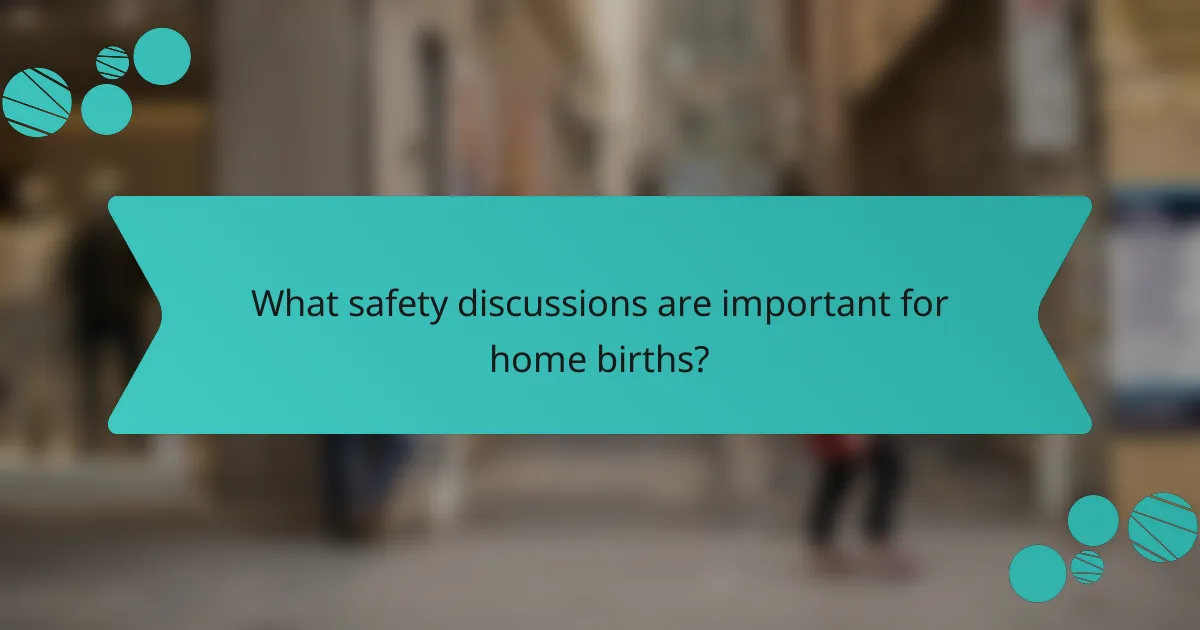
What safety discussions are important for home births?
Safety discussions for home births focus on understanding potential risks and implementing effective safety measures. Engaging in these conversations helps ensure that both the mother and baby are well-prepared for the home birth experience.
Risks associated with home births
Home births can present various risks, including complications such as excessive bleeding, prolonged labor, or issues with the baby’s heart rate. While many women have safe home births, it’s crucial to recognize that emergencies can arise, necessitating immediate medical attention.
Some common risks include the possibility of needing a transfer to a hospital for interventions like cesarean sections or neonatal care. Understanding these risks allows families to make informed decisions about their birth plans and prepare for potential scenarios.
Safety measures and planning
Effective safety measures for home births involve thorough planning and preparation. Families should create a comprehensive birth plan that includes emergency protocols, such as identifying the nearest hospital and having transportation readily available.
Additionally, hiring a qualified midwife is essential. Midwives should be trained in emergency procedures and have access to necessary medical supplies. Regular prenatal check-ups can help monitor the health of both the mother and baby, ensuring that any concerns are addressed before labor begins.

How to choose a home birth midwife in the United States?
Choosing a home birth midwife in the United States involves evaluating their qualifications, experience, and approach to care. It’s essential to select a midwife who aligns with your values and understands your specific needs for a safe home birth experience.
Qualifications to look for
When assessing a midwife’s qualifications, check for certification from recognized organizations such as the American Midwifery Certification Board (AMCB) or the North American Registry of Midwives (NARM). Additionally, consider their educational background, including formal training in midwifery and any specialized courses in home birth practices.
Experience is another critical factor. Look for midwives who have attended a significant number of home births, ideally in the range of 20 to 50. This experience can enhance their ability to handle various situations that may arise during labor and delivery.
Questions to ask during consultation
During your consultation, inquire about the midwife’s philosophy on home birth and how they handle emergencies. Ask about their protocols for transferring care to a hospital if complications arise, and ensure they have a clear plan in place. Understanding their approach to safety can help you feel more secure in your decision.
Additionally, discuss their availability and support during labor. Clarify how many births they attend simultaneously and whether they have backup midwives. This information can provide insight into the level of care you can expect during your home birth.
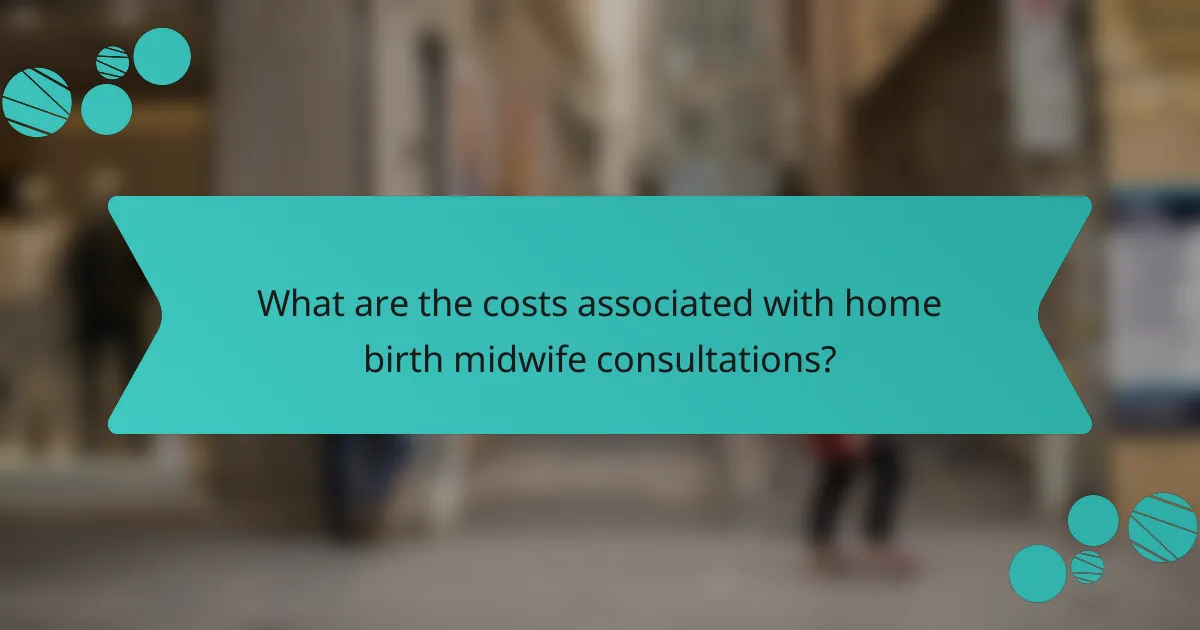
What are the costs associated with home birth midwife consultations?
The costs of home birth midwife consultations can vary significantly based on location, the midwife’s experience, and the services included. Generally, expect to pay anywhere from a few hundred to a couple of thousand dollars for comprehensive care throughout the pregnancy and birth process.
Average consultation fees
Average consultation fees for home birth midwives typically range from $500 to $2,500. This amount often includes prenatal visits, labor support, and postpartum care. Some midwives may charge additional fees for specific services, such as ultrasound or lab work.
It’s essential to discuss the fee structure upfront and understand what services are included in the total cost. Some midwives offer payment plans or sliding scale fees based on income, which can make home birth more accessible.
Insurance coverage options
Insurance coverage for home birth midwife consultations varies widely. Some private insurance plans may cover a portion of the costs, while others may not cover home births at all. It’s advisable to contact your insurance provider to inquire about specific coverage details and any necessary documentation.
Additionally, some states have regulations requiring insurance companies to cover midwifery services. Check local laws to see if you’re eligible for reimbursement. If insurance coverage is limited, consider discussing payment options directly with your midwife to find a suitable arrangement.

What are the local regulations for home births in California?
In California, home births are legal and regulated, requiring midwives to adhere to specific guidelines to ensure safety and proper care. The state mandates that licensed midwives must be certified and follow established protocols to conduct home births safely.
Licensing requirements for midwives
In California, midwives must be licensed by the Medical Board of California or the Board of Registered Nursing. To obtain a license, midwives typically need to complete an accredited midwifery education program and pass a national certification exam.
Additionally, midwives are required to maintain their licenses through continuing education and adhere to the standards set forth by state regulations. This ensures that they stay updated on best practices and safety protocols in home birth settings.
It is crucial for families considering a home birth to verify the midwife’s credentials and ensure they are in good standing with the appropriate licensing board. This helps to ensure a safe and legally compliant home birth experience.
